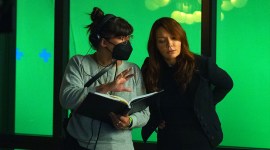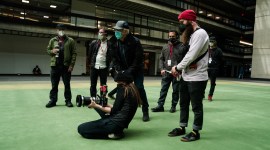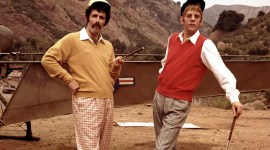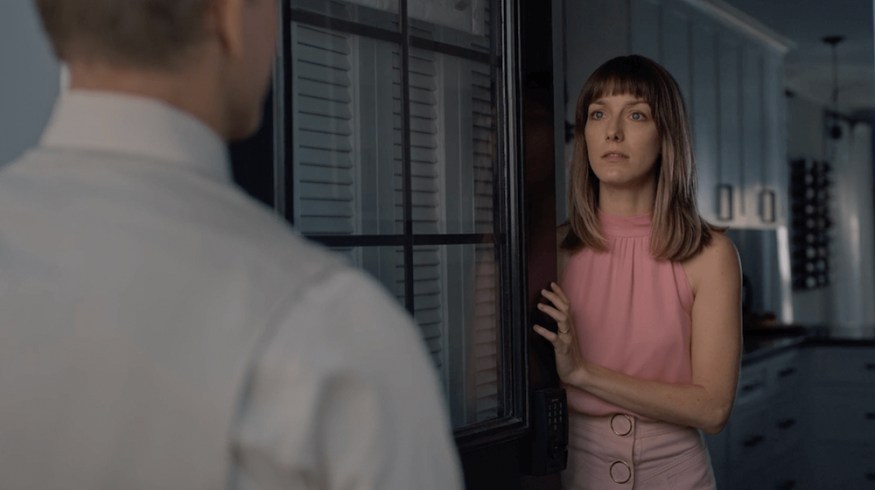
Laura Seay on Transitioning from Actor to Director
PremiumBeat sat down with actor-turned-director Laura Seay for first-hand insights on the challenges and rewards in making this transition.
Some people enter the film industry as actors and then either end up becoming fascinated with other aspects of the business, or discover that their passion for acting is actually their passion for storytelling. Laura Seay is one such actor.
Introduced to audiences as Shirley in the classic coming-of-age comedy Superbad, she’s worked consistently on television, including the Marvel universes’ Agents of Shield and the police procedural NCIS.
In 2016, she wrote and helmed her first project, the profoundly personal Speak. Since then—and in no small feat during a pandemic—she’s been hired to direct two other short projects, The Coupon and The Baldwin Archives.
For all those actors thinking about stepping behind the camera, Laura was gracious enough to sit down with us to explore her journey and her process. Given her love and interest in acting, writing, and directing, the first thing on our minds is: How would she define herself as an artist?
I’d say I’m a storyteller who is driven by vulnerability. I think it’s one of the most connective energies we have. So, when I take on different facets in storytelling, especially ones I haven’t done before, I’m challenging myself to this end. It’s my job as an artist to face discomfort—my responsibility even. So, I seek it out ceaselessly.
– Laure Seay
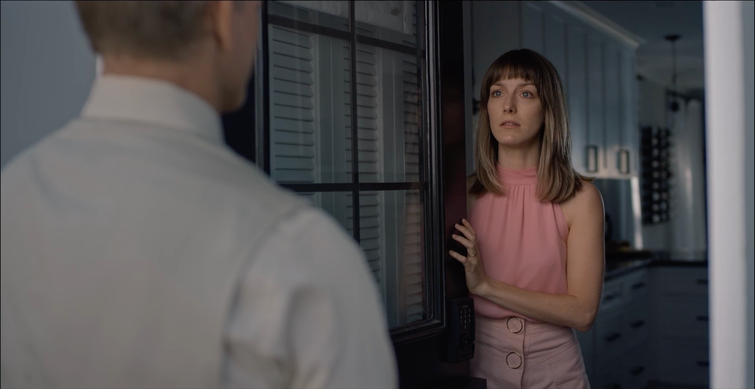
It’s apt she describes herself as seeking out discomfort as her background reveals someone who’s utterly fearless. She grew up in three different countries before the age of eight. She was also a child Shakespearean actor and has been known to jump on stage to do stand-up comedy.
Even the roles she’s often asked to do on television are intensely emotional. Not to mention the mere act of guest-starring on an established show puts you immediately at a disadvantage not knowing the cast, crew, or culture.
We wondered what motivates her to step up to the plate and go to these vulnerable places.
I’m gonna sound like a broken record here, but if something scares me, I move toward it. Obviously not in terms of putting myself in literal danger . . . I mean challenging my brain’s comfort zone. Moving around so much was certainly not my choice, but it did sort of give me adaptive superpowers. Observing people and determining their motivations quickly is a good skill when you’re switching schools so often. Varied rhythms and aesthetics cemented themselves into little-Laura-brain early on with living overseas.
When we finally settled in the states, the Seattle Shakespeare Company was where I fell in love with acting. The artistic director there at the time, Stephanie Shine, was doing the heroic work of teaching a bunch of pre-teens the power of The Bard. She was fearless. She was the one who told me to keep going.
I’ve acted for so long that it feels very familiar to me. I’ve definitely done my fair share of crying on television. I’m grateful to have been trusted with those roles by my co-stars and great directors. Richard J. Lewis is a big hero of mine in the television directing space.
Directing and writing came later when I was in a stagnant period with representation. I wasn’t auditioning, and I’m grateful for that time. It forced me to find my voice.
I started doing stand-up at the end of 2019 for similar reasons. I wanted to learn another way of storytelling, and to really clarify my writing skills. Stand-up is all about accuracy. You need to know exactly what you’re saying and why. Plus, I missed the high-wire energy of the live stage. When you bomb, it’s nauseating. But, when your material works, that’s an immediate high you just can’t beat. Both scenarios are really valuable in the feedback they offer.
– Laura Seay
Here, Laura does a deeper dive into what motivates her storytelling.
In the last few years, there’s been much press on how women in front of the camera are treated. Concerning women and Hollywood, another actor, writer, and director, Sarah Polley, shared her revelation that directing made her aware of sexism in the industry:
Shortly afterward, I started writing and directing short films. I had no idea, until then, how little respect I had been shown as an actor. Now, there were no assistant directors trying to cajole me into sitting on their laps, no groups of men standing around to assess how I looked in a particular piece of clothing. I could decide what I felt was important to say, how to film a woman, without her sexuality being a central focus without context.
– Sarah Polley
Considering Seay’s breakout role was in the good-natured but raunchy Superbad, I suggested her experience on that film might have kickstarted her desire to put women at the center of the narrative. She didn’t see it that way.

I’d have to respectfully disagree on the Superbad front. I can definitely understand your interpretation, but I think the point of the film is to highlight the futility of burgeoning male sexuality in our society.
Young men are taught to pursue women as trophies and milestones. This is definitely how the film starts out, but I feel the narrative leads us to the truth—that these young girls trump the one-dimensional assumptions placed on them, and that the boy’s boning-missions are actually just innate triangulations of their feeling vulnerable about an unknown future and its threat to their friendship.
I really loved working on that film and can’t say enough good things about everyone involved. It was really strange being the age demographic of the movie itself while filming . . . and it was also helpful.
My subsequent work deals with a lot of the same themes ironically. Not about teenage boys trying to get laid, ha, but about folks struggling to express their emotions, and then acting in deflective ways because of it.
Trauma has that effect. Societal and personal. I hope to illuminate these human, but misguided copings.
– Laura Seay
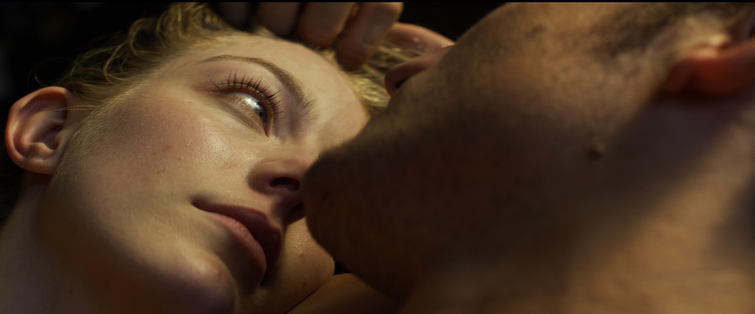
Ten years after Superbad, she made Speak. It’s a nuanced exploration of a woman navigating a new relationship after trauma. One small moment resonated.
She gets out of the Uber a bit tipsy, and her interested suitor asks about another date. He’s specific. Suggests a day or event and includes the idea of “smoking.”
She takes control by countering with another time and mentions that “smoking is not really my thing.” The edit then cuts to her on the couch smoking a bowl. It’s early in the film, and we don’t know her damage, but it was a lovely way to show the character’s complexity.
We asked about her writing process as she has such a wonderful instinct to reveal character through action.
I really love that you noticed that moment. That was a way to convey her already hiding things from him. Knee-jerk protections in place from having let others in too soon.
When I’m writing for the camera, I try my best to show and not tell. This might come from my acting background. I think behavior as a performer is always more important than the words being said.
– Laura Seay
Here, Laura talks more about her process, and the use of questions as a tool for actors and directors.
Since Speak, she’s developed a creative family, most recently collaborating with Micah Cohen’s production company, Babybird Worldwide, to direct The Coupon.
The film follows a woman who finds herself embroiled in a Kafkaesque legal nightmare when her husband gives away the cutesy romantic coupon she made for him to a stranger. That stranger shows up on her doorstep, demanding she honor it. It’s different in tone to Speak (clever, menacing, dark, and funny), but has her artistic stamp.
Laura discusses how she achieved the aesthetics of both projects by forging an intimate working relationship with Cinematographer John Orphan.
Here she provides insight on the particular look and feel she was going for on The Coupon.
One of the most important aspects of filmmaking is post-production. Often, new filmmakers’ pre-production is focused so heavily on getting the script right and all the elements necessary for production that post-production and distribution can suffer.
With her first film, Speak, Laura fell a bit into that trap, but was smart enough to take her time finding the perfect editor.
Both Speak and The Coupon had successful festival runs. Although it’s possible to make a bit of money selling your short film, Laura’s advice is to focus on making it widely available to generate interest in you as a filmmaker. Have the next project ready to go, too.
Finally, we asked Laura if she had any advice for actors who want to create their content. Anything she wished someone had told her before she made her first film?
Decide what thing you are uniquely qualified to talk about, and why. Then say it. Find any way to say it. There are no rules. Just make stuff and don’t stop.
– Laura Seay
For more filmmaking insights and advice, take a look at these articles:
- How Reed Morano’s Cinematography Turns the Camera into a Character
- Create Better Establishing Shots with These Photography Techniques
- 5 YouTubers to Follow for Creative Cinematography
- The Power of Movement: The Best Gimbals for a Small Budget
- Faster, Louder, Bolder: “LFG” Editor on the Modern Docudrama
Cover image via Baby Bird Worldwide.


